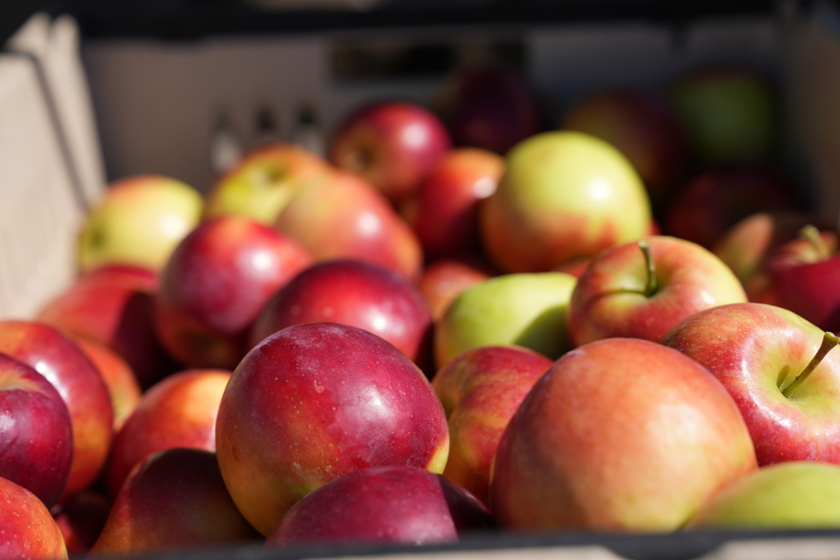Purdue continues the pursuit of the “perfect” apple
A trailblazer in the science of breeding apple varieties, Purdue’s College of Agriculture has developed apple varieties popular throughout the Midwest and planted around the world, continuing the decades long legacy at Meigs Purdue Ag Center just south of Lafayette.
Purdue began breeding apples in 1945, with 48 varieties being born from the work of faculty in Horticulture and Landscape Architecture. Under the leadership of Jules Janick, professor emeritus of horticulture, Purdue currently holds 18 apple variety patents. Some of the more popular varieties currently found in orchards around the world include GoldRush, Pixie Crunch, CrimsonCrisp and Juliet.
Abhijit Karve, director of business development in the Office of Technology Commercialization, said patenting apples is a bit different than patenting other technologies. Apples are an asexually propagated plant, propagated by grafting rather than grown from a seed. A particular variety receives a plant patent after meeting specific qualifications, Karve explained, such as specific botanical descriptions of a tree and its fruit.
 Purdue licenses several varieties globally, with the majority of licensees being in Europe, New Zealand and Australia. The university owns several trademarks as well.
Purdue licenses several varieties globally, with the majority of licensees being in Europe, New Zealand and Australia. The university owns several trademarks as well.
“Pixie Crunch is actively trademarked, which is a very popular variety at u-pick orchards,” Karve said. “But then there are others that have a very strong reputation in Europe, like the Juliet variety, which is currently the best-selling organic apple variety in Europe.”
Peter Hirst, professor in the Department of Horticulture and Landscape Architecture (HLA) and associate director in International Programs in Agriculture (IPIA), said his work in the apple industry falls more along the lines of helping growers by developing better methods for pruning, growing and caring for a tree. His research focuses on the physiology of an apple.
An apple Hirst has been focusing on lately is likely one that isn’t on anyone’s radar at the u-pick orchard: the crab apple.
“Crab apples and your average apple at the store are both apples; they’re from the same family,” Hirst said. “But it doesn’t matter how much fertilizer you put on the tree, a crab apple is still going to be very small. The genetic control of the crab apple is really strong, but why is that? If we can understand that, then we could understand how to develop apples better.”
There are over 200 individually different apple genotypes grown at Meigs, Hirst said, with many trees being named varieties, such as GoldRush and Pixie Crunch. Others are the only apple tree variety in the world. These unique trees aren’t on the path to be patented, Hirst explained, because their existence serves as a research tool to better understand how fruit size is regulated.
Few other pieces of produce are known by their varieties as apples are, Hirst said. Most consumers wouldn’t be able to list different varieties of bananas, but they can name at least five different types of apples. When it comes to finding the perfect apple, however, that’s up to the eye of the beholder, or apple picker in this case.
“That’s why stores sell Granny Smiths. The apple has been around for over 100 years. Its texture is awful, like rubber, and it's kind of sour,” Hirst said. “But people can love and enjoy any apple variety. In my opinion, the perfect apple variety is whichever one people are going to eat. It could be debated all day long, but the one thing that can’t be denied is that an apple is a healthy snack.”






